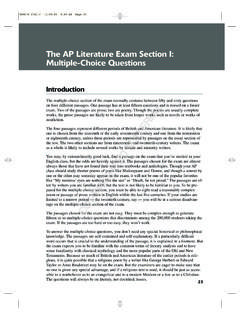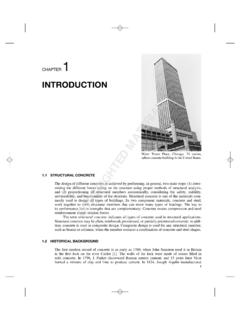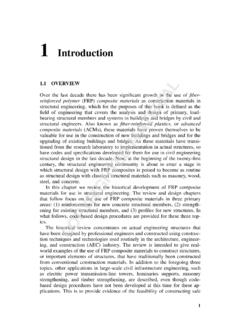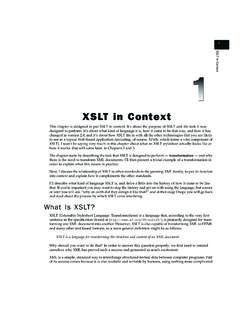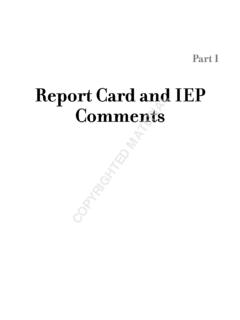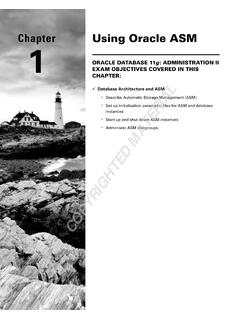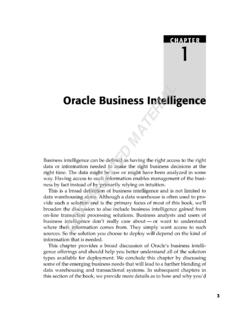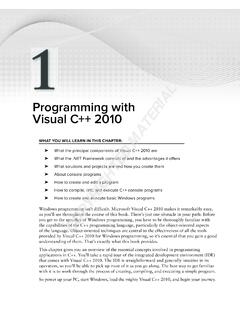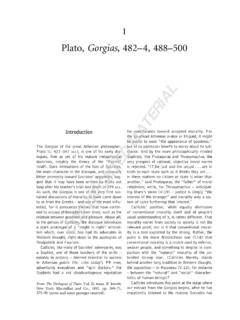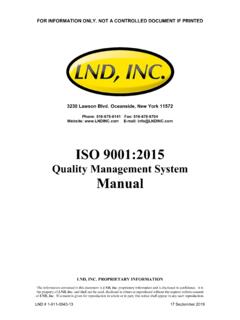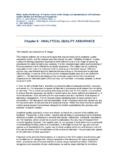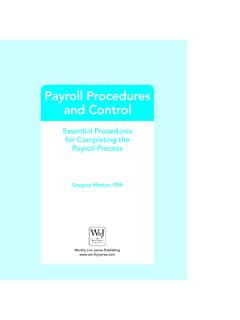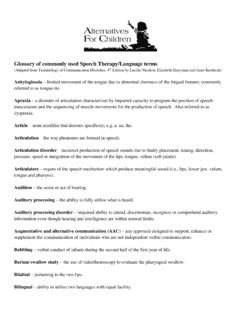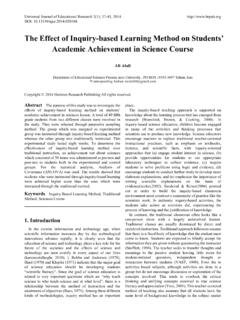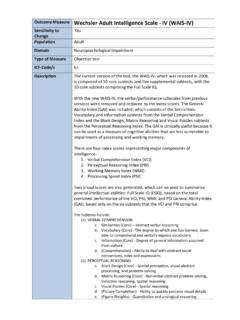Transcription of Corporate governance: frameworks and mechanisms
1 Part ICorporate governance : frameworks and mechanisms 1/12/10 10:47 AM Page 1 COPYRIGHTED 1/12/10 10:47 AM Page 2 Chapter 1 Defining Corporate GovernanceAims and ObjectivesThis chapter provides an introduction to the Corporate governance discipline, predominantly froma UK perspective. The specific objectives of this chapter are to: discuss a range of definitions of Corporate governance in order to arrive at a definition that isappropriate for this text, appreciating the dynamic nature of the subject; appreciate the development of Corporate governance from a historical perspective; compare and contrast several theoretical frameworks that are applied to the Corporate gover-nance discipline; demonstrate the growing importance of a stakeholder-oriented approach to Corporate governance ; consider the frontiers of academic research in Corporate Corporate governance has become one of the most commonly used phrases in the current global busi-ness vocabulary .
2 The global financial crisis and credit crunch which have engulfed financial markets andeconomies around the world, causing bank failures and resulting in a recession in the UK and else-where, have further catapulted Corporate governance onto centre stage. Increasingly, weaknesses incorporate governance are being held up as reasons for and causes of the current crisis. Excessive execu-tive remuneration, failures in risk management and internal control systems, weak monitoring, lack ofindependence in the boardroom and a distinct dearth of boardroom ethics are being blamed for the liq-uidity crisis and its repercussions. There is a public outcry at the way in which bankers have taken riskswhich have led to the crisis, at the same time receiving massive salaries and bonuses, with calls 1/12/10 10:47 AM Page 3greater accountability from the banking sector. The notorious collapse of Enron in 2001, one ofAmerica s largest companies, focused international attention on company failures and the role thatstrong Corporate governance needs to play to prevent them.
3 Similarly, Corporate crises such as Parmalathave shown that Corporate governance weaknesses in different economies around the world can lead tosimilar problems. The UK responded to Enron by producing the Higgs Report (2003) and the SmithReport (2003), whereas the US produced the Sarbanes Oxley Act (2002). However, the effectivenessof these principles and codes of Corporate governance best practice may be called into question in thelight of recent the UK and the USA responded sharply and effectively to the failure of Enron, bystrengthening the Corporate governance framework, something seems to be missing from their policy-makers focused on strengthening systems of internal control ( internal audit, auditcommittees and the role of non-executive directors, for example), the current crisis is riddled withcorporate governance failures emanating from poor risk management, inadequate internal controlsand weak monitoring of boards.
4 What has gone wrong? frameworks for good Corporate governanceare embedded in the UK, the USA and elsewhere around the world, but for some reason these frame-works have not delivered protection to major banks and other significant organizations. The linksbetween weak Corporate governance and Corporate collapse are now being made for the first time inrelation to the current crisis. Corporate governance problems were identified as primary causes forprevious Corporate failures. So why were lessons not learned? Why did banks and other organizationsrepeat earlier mistakes, when they were so well-publicized? This is a mystery for academics and policy-makers alike, and remains a question requiring debate, even when this book has explored around the world have instigated far-reaching programmes for Corporate governance reformfor some years now, as evidenced by the proliferation of Corporate governance codes and policy docu-ments, voluntary or mandatory, both at the national and supra-national level.
5 See Figure in Chapter 7for an illustration of how Corporate governance best practice is being diffused around the world throughthe gradual development of codes of practice in a profusion of countries. In my view the present focus oncorporate governance will be maintained into the future and over time, especially given recent events. Thephenomenal growth of interest in Corporate governance has been accompanied by a growing body of aca-demic research. As the discipline matures, far greater definition and clarity are being achieved concerningthe nature of Corporate governance . Furthermore, as the discipline matures both in terms of academicresearch and in terms of policy-making and codes of practice, the definition of Corporate governance isevolving rapidly. As we shall see throughout this chapter, Corporate governance is a dynamic conceptwhich has grown and transformed in many varied ways over the last 15 years. It is likely that corporategovernance will continue to evolve in the future both passively, in response to events, but also actively, asacademics and practitioners seek to improve continuously the accountability of organizations to stake-holders and to society as a of the most significant developments in Corporate governance has been its increasingly inclusivenature, with stakeholder concerns being of growing importance to companies worldwide.
6 For instance,the ever-worsening climate change crisis is becoming a crucial aspect of companies strategic decision-making and risk management systems. Some may suggest that financial aspects of Corporate governance4 CORPORATEGOVERNANCE: frameworks 1/12/10 10:47 AM Page 4need to be addressed before issues such as climate change. However, it is not possible for the corporatecommunity and policy-makers to focus exclusively on the financial crisis: the climate crisis is happeningat the same time and cannot be pushed to one side while financial issues are addressed. Indeed, climatechange may offer solutions as well as problems in the current climate of financial depression, as green technologies offer opportunities for economic development, as they attempt to solve the problems asso-ciated with climate change. This chapter considers the broad-ranging nature of Corporate governance andthe many ways of defining the subject. Corporate governance is now discussed from a theoretical per-spective, setting the scene for the following is Corporate governance ?
7 There is no single, accepted definition of Corporate governance . There are substantial differences indefinition according to which country is considered. The main focus of this chapter and the followingfive is the agenda for Corporate governance reform, mainly from a UK perspective. However, corpo-rate governance failures in the USA and Italy are used in Chapter 2 to demonstrate the need to improvecorporate governance mechanisms . Even within the confines of one country s system, such as the UK,arriving at a definition of Corporate governance is no easy task, especially given the evolving anddynamic nature of Corporate governance . Corporate governance as a discipline in its own right is rela-tively new. The subject may be treated in a narrow or a broad manner, depending on the viewpoint ofthe policy-maker, practitioner, researcher or theorist. It seems that existing definitions of corporategovernance fall along a spectrum, with narrow views at one end and more inclusive, broad viewsplaced at the other.
8 One approach towards Corporate governance adopts a narrow view, where corpo-rate governance is restricted to the relationship between a company and its shareholders. This is thetraditional finance paradigm, expressed in agency theory and epitomized in the definition encapsu-lated in the Cadbury Report (1992), which defined Corporate governance as, .. the system by whichcompanies are directed and controlled . At the other end of the spectrum, Corporate governance maybe seen as a web of relationships, not only between a company and its owners (shareholders) but alsobetween a company and a broad range of other stakeholders : employees, customers, suppliers, bond-holders, to name but a few. Such a view tends to be expressed in stakeholder theory . This is a moreinclusive and broad way of treating the subject of Corporate governance and one which has graduallyattracted greater attention in recent years, as issues of accountability and Corporate social responsibil-ity are brought to the forefront of policy and practice in the UK and elsewhere.
9 A relatively early def-inition of Corporate governance sought to establish a broader remit for Corporate governance than thatenshrined in agency theory:.. the governance role is not concerned with the running of the business of the company per se,but with giving overall direction to the enterprise, with overseeing and controlling the executiveactions of management and with satisfying legitimate expectations of accountability and regulationby interests beyond the Corporate boundaries(Tricker, 1984) 1/12/10 10:47 AM Page 5 However, it is interesting that the recent Walker Review (2009) defined Corporate governance asfollows:The role of Corporate governance is to protect and advance the interests of shareholders throughsetting the strategic direction of a company and appointing and monitoring capable managementto achieve this(Walker Review, 2009, p. 19)Despite the far-reaching impact of the current global financial crisis and the now generally acknowl-edged need for Corporate governance to be treated in a more stakeholder-inclusive manner, the WalkerReview tends to assume a rather shareholder-centric approach to Corporate general, the definitions of Corporate governance found in the literature tend to share certain charac-teristics, one of which is the notion of accountability.
10 Narrow definitions are oriented around corporateaccountability to shareholders. Some narrower, shareholder-oriented definitions of Corporate governancefocus specifically on the ability of a country s legal system to protect minority shareholder rights ( ,La Porta et al., 1998). However, such definitions are mainly applicable to cross-country comparisons ofcorporate governance , and at present we are focusing on Corporate governance within the UK. We returnto the legal influence on different systems of Corporate governance around the world in Chapters 7 and definitions of Corporate governance stress a broader level of accountability to shareholders andother stakeholders. The broadest definitions consider that companies are accountable to the whole of society, future gen-erations and the natural world. This text presents a relatively broad definition of Corporate governancefor the purposes of this book, based on my own view of Corporate governance issues.
